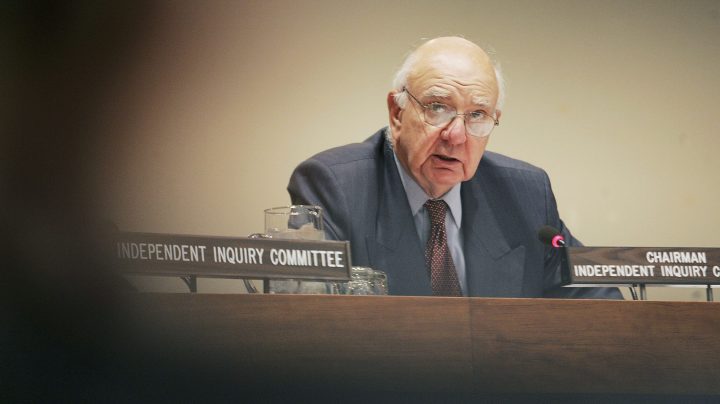
Former Federal Reserve Chairman Paul Volcker has died at 92
Share Now on:
Former Federal Reserve Chairman Paul Volcker has died at 92

Paul Volcker, the former Federal Reserve chairman who in the early 1980s raised interest rates to historic highs and triggered a recession as the price of quashing double-digit inflation, has died, according to his office. He was 92.
Volcker took charge of the Fed in August 1979, when the U.S. economy was slipping into the grip of runaway inflation. Consumer prices skyrocketed 13% in 1979 and then by the same amount again in 1980.
Volcker worked relentlessly to bring prices under control. He pushed the Fed’s benchmark interest rate from 11% to a record 20% by late 1980 to try to slow the economy’s growth and shrink inflation.
Those high interest rates made it so expensive for people and companies to borrow that the economy weakened steadily. By January 1980, a recession had begun. It lasted six months before a deeper and more painful downturn took hold in July 1981. It endured for 18 months and sent unemployment up to 10.8% in November and December 1982, the highest level since the Great Depression.
In the midst of it, Volcker was vilified by the public. Homebuilders put postage stamps on bricks and on two-by-four wooden planks and mailed them to the Fed to protest how super-high interest rates had wrecked their businesses. Auto dealers, stuck with lots full of unsold cars, did the same with car keys. Angry farmers, struggling with high debts, drove their tractors to Washington and blockaded the Fed’s headquarters.
But the pain eventually paid off. Inflation receded. Once it did, Volcker’s Fed began lowering interest rates. And the economy bounded back strongly enough for President Ronald Reagan to declare the arrival of “Morning in America’’ on his way to a landslide victory in the 1984 presidential election. Volcker left the Fed in Aug. 11, 1987, succeeded by Alan Greenspan.
The Volcker-led victory over inflation is widely credited with beginning what economists call the “Great Moderation’’ — more than two decades of mostly steady economic growth, relatively low unemployment and modest price increases. The Great Moderation ended with the Great Recession of 2007-2009. Volcker had spent most of his career in the public sector — at the Treasury Department, the Federal Reserve Bank of New York and the Fed board in Washington.
Six-foot-seven and perpetually rumpled, Volcker favored cheap cigars and bad suits. John Connally, a slick Texan who was Volcker’s boss at the Treasury in the early 1970s, reportedly once threatened to fire him if he didn’t get a haircut and improve his wardrobe.

After leaving the Fed, Volcker took on assignments as a troubleshooter. He ran a commission to investigate what Swiss banks did with the assets of Holocaust victims during and after World War II. The United Nations assigned him to look into allegations of corruption in a UN program to provide food aid to Iraq.
After the financial crisis of 2008, President Barack Obama recruited him as an economic adviser. Volcker pressed for restrictions on banks’ ability to trade in financial markets with their own money, rather than their clients’, and to invest in private equity and hedge funds.
The resulting regulation, known as the “Volcker rule,’’ was included in a far-reaching financial overhaul bill Congress passed in 2010. Volcker had little sympathy for big banks in the wake of the financial crisis, which required a taxpayer bailout of big Wall Street firms. He dismissed claims that deregulated financial institutions deserved credit for coming up with innovative products and services.
The only useful financial innovation he’d seen in years, Volcker said, was the ATM.
In 2012, “Marketplace” host Kai Ryssdal sat down with Paul Volcker and his biographer, the financial historian William Silber. You can listen to and read the transcript of that interview here.
There’s a lot happening in the world. Through it all, Marketplace is here for you.
You rely on Marketplace to break down the world’s events and tell you how it affects you in a fact-based, approachable way. We rely on your financial support to keep making that possible.
Your donation today powers the independent journalism that you rely on. For just $5/month, you can help sustain Marketplace so we can keep reporting on the things that matter to you.


















